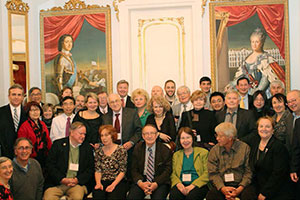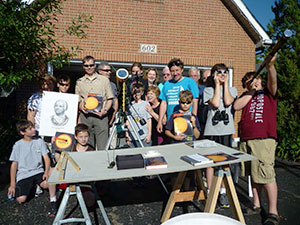The Russian-American Scientists Association (RASA)
Vladimir Shiltsev
The Russian American Scientists Association (RASA) is a US-based organization representing the Russian science community. RASA is a nonprofit organization working to consolidate the Russian scientific diaspora, to advance the career development and qualifications of its members, and to provide opportunities for social and cultural exchanges. RASA represents over 200 members, including scientists, engineers and hi-tech entrepreneurs in academia, national laboratories and industry in the United States. Together with a European branch, RASA is an integral part of the international Russian-speaking Academic Scientists Association. The objectives of RASA include exchange of knowledge and experience, initiation of joint projects and coordination of research programs, organization of conferences, seminars, research schools, sharing knowledge of teaching programs and lecture materials (more on RASA and its goals can be found in the December 2012 issue of “APS News”).
RASA is governed by a Coordinating Committee comprised of leading US scientists representing a wide spectrum of research areas–physics, biology, mathematics, biomedicine, chemistry, etc., as well as those working in many high-tech and IT areas. We hold annual conferences; the next conference will take place in Clearwater, FL on November 8-10, 2013. In addition, RASA actively interacts with Russian scientific-educational and governmental organizations. At the request of the Russian Corporation of Nanotechnologies (RUSNANO) and the Ministry of Education and Science (RMES), many members of RASA provided scientific expertise on applications for various supporting grant programs. Some dozen members of RASA actively collaborate with individual Russian institutions and lead research groups in Russia. In 2010 RASA along with RMES started the program of the International Center of Advanced Science. Under this program, undergraduate and postgraduate students from Russian universities compete for scholarships from the President of the Russian Federation for training in research centers abroad in fields such as biotechnology, energy, nuclear technology and software, medical equipment and pharmaceuticals, aerospace and telecommunications, nanotechnology, etc. At present, there are four ICAS centers in the US: at Argonne National Laboratory and Fermi National Accelerator Laboratory (both in IL), Boston’s Children Hospital (MA) and at Stony Brook University (NY).
Since 2011 RASA has actively participated in and coordinated activities aimed at cooperation with the Skolkovo Institute of Science and Technology (SkTech), which is formed as part of a cooperative agreement between the Russian Foundation of the Center of Research and Commercializing of New Technologies “Skolkovo” and the Massachusetts Institute of Technology–see http://sktech.mit.edu/. RASA members take an active part in reviews of the proposals for the organization of the SkTech / MIT research centers.

Participants of "Day of Russian Science" meeting at the Russian Center for Science and Culture in Washington, DC (http://rccusa.org/) on February 11, 2013
 Scientific outreach event in Batavia, IL on the day of the observation of the transit of Venus with modern and antique telescopes (June 5, 2012).
Scientific outreach event in Batavia, IL on the day of the observation of the transit of Venus with modern and antique telescopes (June 5, 2012).
Together with the Russian Center of Science and Culture in Washington, DC, RASA organized a tercentennial celebration of the great Russian polymath Mikhail Lomonosov in November 2011 and 150th anniversary of physicist/geochemist Vladimir Vernadsky in March 2013 (see http://usa.rs.gov.ru/en/node/1230.) Highlights of the latter include presentations of Prof. Roald Sagdeev (University of Maryland) on development of the Russian Academy of Sciences and Prof. Edwin Squires (George Washington University) "The concept of the biosphere: the life and legacy of Vernadsky". Dan Davidson, President of the American Councils for International Education, gave a presentation on current issues of university research in the US and his vision for cooperation between Russian and American scientists.
Among other notable activities of RASA members was the organization of and participation in an international team of scientists to replicate an experiment by 18th-century Russian scientific and literary luminary Mikhail Lomonosov in a quest to demolish skeptics’ doubts that he discovered Venus’ atmosphere. Using an early achromatic telescope from his St. Petersburg observatory in 1761, Lomonosov had witnessed evidence of Venus’ atmosphere in the form of a “luminous arc” jutting out from the planet as it made its rare transit between Earth and the Sun. The 2012 transit of Venus gave us a chance to reproduce Lomonosov’s 1761 observation with antique 18th-century telescopes simultaneously in the US, Russia and Canada and demonstrate the instruments’ excellent quality. Results of the successful replication are reported in the February 2013 issue of Physics Today.
Recent turmoil over proposed reforms of the Russian Academy of Sciences (RAS) – see, e.g., “New Law Would Dilute and Diminish Science Academy” in Science (5 July, 2013) – raised serious concerns in the broad international scientific community, including in the US National Academy and in the National Academies of many other countries, as well as in the Russian-speaking scientific diaspora in the US. Many prominent members expressed their fears that proposed reforms will be carried out without taking into the account the opinion of the scholarly community, will weaken RAS as a center of basic research and likely diminish the high position of Russian science and scholarship, will transfer the administrative responsibility of scientific research from scholars to state officials, and will remove protection of freedom from outside pressure.
RASA is seeking new members – so, if you want to join, please, email us at mod.rasa.usa@gmail.com.
Vladimir Shiltsev is President of the Russian-American Scientists Association (RASA) and Director of the Accelerator Physics Center, Fermilab, Batavia, Illinois.
Disclaimer - The articles and opinion pieces found in this issue of the APS Forum on International Physics Newsletter are not peer refereed and represent solely the views of the authors and not necessarily the views of the APS.
